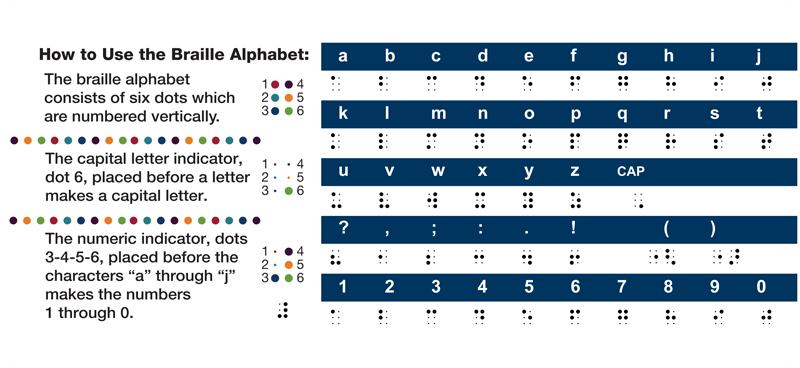
January is National Braille Literacy Month. Braille is a system of tactile reading and writing developed to meet the needs of the visually impaired.
Braille was modeled after an early touch reading system called night writing. Night writing was developed by Charles Barbier, who served in the French army under Napoleon Bonaparte in the early 1800's. Barbier was trying to create a safe way for soldiers to read communications at night. French soldiers were being targeted and killed when they turned on their lamps to read in the dark. Barbier created a system with 12 raised dots ordered in two columns and six rows. Letters and phrases were represented by different formations of the 12 dots in a symbol called a cell. This early system was hard to use because most of the cells required two hands to read.
Along come Louis Braille. Braille was born January 4, 1809, in France. Braille was not blind at birth. At the age of three Braille's right eye was accidentally punctured by a tool while he was in his father’s workshop. Blinded in one eye, soon his left eye sympathetically stopped working and Braille became totally blind.
In 1819, Braille was accepted into the National Institute for Blind Children, in Paris. At the school he learned night writing but found it difficult to use. In 1824, at the age of 15, Braille adapted night writing into his braille code.
Braille used a smaller cell with six raised dots specifically structured in patterns of three rows and two columns. This structure makes each cell easy to read with just one finger. The cells can represent different letters of the alphabet, punctuation marks and phrases to show letter groupings. The code was based on the French alphabet.
In 1837, Braille published his second revision to the code, which included musical notations. With this publication braille became the first official binary form of writing in modern times.
Louis Braille died at the age of 43 from tuberculosis. His body was laid to rest at the Pantheon in Paris. The braille reading and writing system is still the standard for sightless individuals to this day.

Did you know that the Alachua County Library District (ACLD) has a Braille collection?
Our collection includes a braille primer, children’s books, and adult books written in braille.
The adult braille and children's braille collections can be found in different areas at each library branch so please don’t hesitate to ask staff for assistance in locating your materials. We’re here to help!

Some of our notable adult Braille titles include The Hunger Games, Sharp Objects, Memoirs of a Geisha, and State of Fear (Crichton).
Some of our notable Braille children’s titles (most of which have print, pictures, and Braille) include books such as Fancy Nancy, Pete the Cat Saves Christmas, and Dr. Seuss & Mercer Mayer titles. Find more from the Children's Braille Book Club.
We also have chapter books in our Children’s Braille collection. These books do not have print or pictures (Braille only) and include A Wrinkle in Time and The Lion, the Witch, & the Wardrobe.
For some extra fun, check out this video of a young adult reading Madeline in Braille.
The state of Florida has a Division of Blind Services in the Florida Department of Education that can also be of service.
All ACLD items can be placed on hold via the online catalog, or by calling any of your local Alachua County Library branches.
If you qualify for the service, you can also get a lot of great materials through the National Library Service (for the Blind and Print Disabled). They can be reached at 1-888-657-7323
Are you interested in learning more about Braille?
- Read Across America day – learning to love literacy through Braille
- History of Braille & How to Read & Write Braille
- National Library Service – Braille Literacy: Resources for Learning and Reading
- Learn Unified English Braille online
- Unified English Braille chart
- Braille Games
- UNESCO - World languages w/ Braille on p.31
National Federation of the Blind encourages YOU! You CAN do it!
You can live the life you want; blindness is not what holds you back.
The National Federation of the Blind knows that blindness is not the characteristic that defines you or your future. Every day, we raise the expectations of blind people because low expectations create obstacles between them and our dreams.
The National Federation of the Blind, founded in 1940, is the oldest and largest U.S.-based organization of blind Americans.
"Our sighted friends often ask for advice regarding what they should do or say when meeting a blind person. Blind people are ordinary people, so please don't be nervous around us. We are also highly capable people, so please don’t grab our arms, our canes, or our guide dogs if we haven't asked you to do so. For more tips, we invite you to read our Courtesy rules of blindness."
Libraries have a history of making information accessible to all. The American Library Association’s (ALA) preamble to the Library Bill of Rights states, "all libraries are forums for information and ideas." By removing the physical, technological, and procedural barriers to accessing those forums, libraries promote the full inclusion of persons with disabilities into our society.
Further, according to the ALA policy on Library Services for People with Disabilities:
"All library resources should be available in formats accessible by persons of all ages with different abilities. These materials must not be restricted by any presuppositions about information needs, interests, or capacity for understanding. The library should offer different, necessary modes of access to the same content using equipment, electronics, or software. All information resources provided directly or indirectly by the library, regardless of technology, format, or method of delivery, should be readily, equally and equitably accessible to all library users. Libraries should make every effort to support the needs of their users with disabilities and when necessary, should seek financial or other assistance to do so."
Information in this article was provided by Literacy Program Specialist Jeremy M.